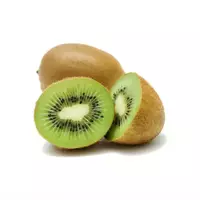Kiwi

Kiwi, compared to other fruits we know, is a very "young" fruit. The history of its cultivation dates back a little over 100 years. Kiwi first appeared in China and then spread to some other countries. In our country, kiwi has recently been considered an extremely exotic fruit. People were wary of it - this fruit has a very unusual appearance, and its taste is not typical for us at all. At the beginning of its albeit short history, the kiwi received the name "monkey peach" - the name is also from the category, to put it mildly, strange.
The largest exporter of kiwis is New Zealand. There, on a grand scale, a festival dedicated to the Kiwi is celebrated.
Kiwi benefits
As for the benefits of the kiwi, here the opinion of scientists, as in any matter, is unanimous. Kiwi is an extremely useful fruit, and even if it contains a minimum of calories. The kiwi calorie content is 47 kcal. 100 gr. The application of kiwi in cooking is very diverse, but for the most part kiwi is used as an addition to various desserts, because it tastes very pleasant and the structure is delicate.
The useful properties of the kiwi will be eloquently told by its composition. Kiwi contains pectins, organic acids, fiber, as well as a large amount of minerals such as phosphorus, magnesium, iron, potassium. In kiwi, in addition, there is an almost complete list of all vitamins known to date: C, A, E, B and others.
Thanks to this composition, the health benefits of kiwi are quite obvious and indisputable. In particular, eating kiwi is extremely beneficial for people suffering from hypertension. The potassium contained in this fruit, in combination with magnesium, has an extremely beneficial effect on the work of the heart, in particular, it has the ability to regulate heart rhythms.
Natural antioxidants are found in the kiwi composition, which, according to experts, help in the prevention and control of cancer. Kiwi will be a good assistant in the treatment of obesity, and it is used at various stages of this disease.
Kiwi has wonderful properties to keep skin youthful. Vitamin E, which is part of the kiwi, is not for nothing considered a "beauty vitamin. " Thanks to it, aging processes slow down, freshness and flowering appearance return to the skin. Kiwi peeling masks are widely and actively used. The flesh of this fruit has an excellent exfoliating effect and, importantly, does not injure delicate and sensitive skin.
Harm to the Kiwi
The harm of kiwi can fully manifest itself when prone to allergic reactions, since this exotic fruit is a rather strong allergen. Kiwi is also contraindicated in gastritis with increased acidity of gastric juice.
kiwi 47 kKal
Energy value of kiwi (Ratio of proteins, fats, carbohydrates - ju):
Proteins: 0.8 g (~ 3 kCal)
Fats: 0.4 g (~ 4 kCal)
Carbohydrates: 8.1 g (~ 32 kCal)
Energy ratio (bj | y): 7% | 8% | 69%
 Español
Español Français
Français Português
Português Русский
Русский 简体中文
简体中文 繁體中文
繁體中文 日本語
日本語 한국어
한국어 العربية
العربية Türkçe
Türkçe Қазақ
Қазақ Deutsch
Deutsch Italiano
Italiano Українська
Українська
